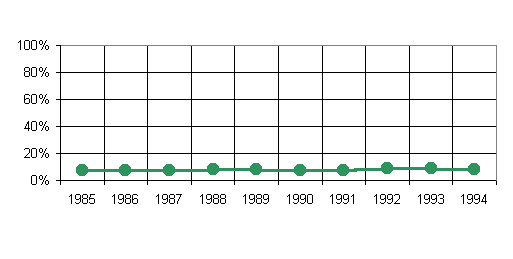Interestingly, it turns out that women don't begin their careers disillusioned, but they slowly become that way:
The Committee discovered that junior women faculty feel well supported within their departments and most do not believe that gender bias will impact their careers. Junior women faculty believe, however, that family-work conflicts may impact their careers differently from those of their male colleagues. In contrast to junior women, many tenured women faculty feel marginalized and excluded from a significant role in their departments. Marginalization increases as women progress through their careers at MIT.One compelling piece of data was this graph of the percentage of MIT's faculty who were women from 1985-1994:

I saw that and I was speechless for about five minutes.
Apparently, women tended to begin their careers thinking the problem of discrimination had already been solved, and then mistrust the conclusions they drew from their own experiences.
An important finding to emerge from the interviews was that the difference in the perception of junior and senior women faculty about the impact of gender on their careers is a difference that repeats itself over generations. Each generation of young women, including those who are currently senior faculty, began by believing that gender discrimination was "solved" in the previous generation and would not touch them. Gradually however, their eyes were opened to the realization that the playing field is not level after all, and that they had paid a high price both personally and professionally as a result.From the letter written by the women Science faculty members that started the study:
We believe that discriminatory attitudes operate at the time of hiring junior faculty and influence the experiences of the women who are hired. Most discrimination at MIT, whether practiced by men or women, is largely unconscious. Often it is difficult to establish discrimination as a factor because any one case, no matter how disturbing or aberrant, can usually be ascribed to its special circumstances... Thus, we need to develop safeguards to prevent, detect, and promptly correct the experiences that together constitute gender discrimination...
The article also had some powerful insights about what constitutes discrimination in our times, which they called the "post-Civil-Rights era."
I'm impressed that they did the study, and doubly impressed that they took its results seriously and made policy changes in response. And the changes have made a difference - in 1999 the School of Science's faculty was more than 10% women for the first time ever. But even that is depressing: 10% is an improvement? We're starting from so far behind.How else might we explain what happened to the senior women faculty in Science? While the reasons for discrimination are complex, a critical part of the explanation lies in our collective ignorance. We must accept that what happened to the tenured women faculty in the School of Science is what discrimination is. It defines discrimination in the period from the 1970s up till today. But we, including for a long time the women faculty themselves, were slow to recognize and understand this for several reasons. First, it did not look like what we thought discrimination looked like. Most of us thought that the Civil Rights laws and Affirmative Action had solved gender "discrimination". But gender discrimination turns out to take many forms and many of these are not simple to recognize. Women faculty who lived the experience came to see the pattern of difference in how their male and female colleagues were treated and gradually they realized that this was discrimination. But when they spoke up, no one heard them, believing that each problem could be explained alternatively by its "special circumstances". Only when the women came together and shared their knowledge, only when the data were looked at through this knowledge and across departments, were the patterns irrefutable.
The tenured women faculty, acting as a group through the Committee, together with the Dean, made a discovery. They identified the forms that gender "discrimination" takes in this post-Civil-Rights era. They found that discrimination consists of a pattern of powerful but unrecognized assumptions and attitudes that work systematically against women faculty even in the light of obvious good will.
This is an important initiative since, even with continued effort of this magnitude, the inclusion of substantial numbers of women on the Science and Engineering faculties of MIT will probably not occur during the professional lives of our current undergraduate students.Damn. Probably not during the professional lives of current undergrads. Damn.
No comments:
Post a Comment